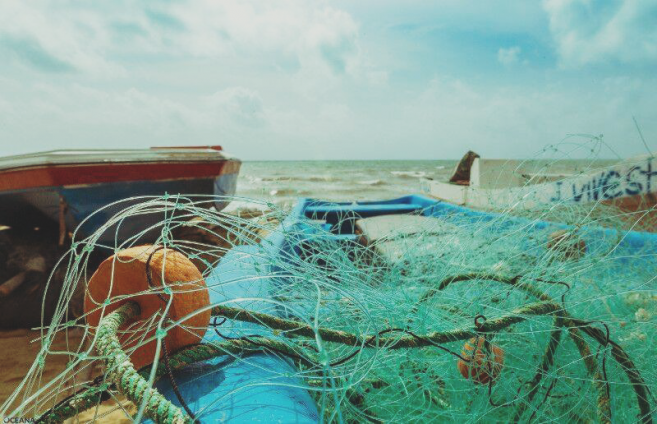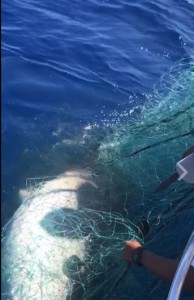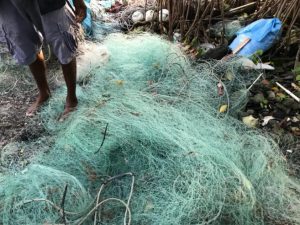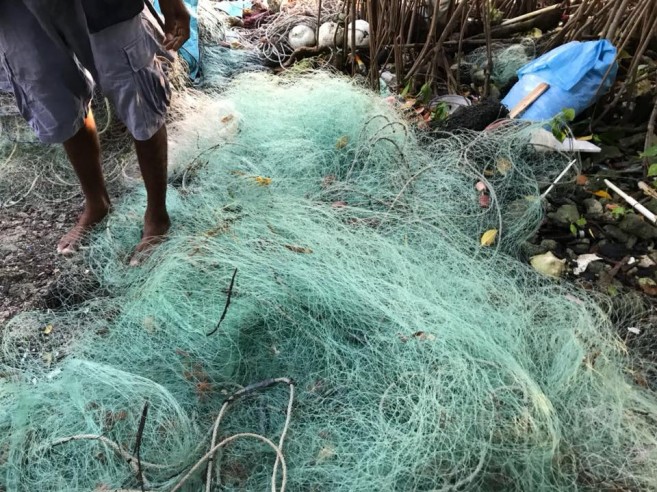On Friday, November 6th, the Government of Belize took a significant step to strengthening marine conservation by putting an end to gillnet fishing in Belizean waters. Non-Governmental Organizations (NGO) in the country are celebrating after years of hard advocacy in the interest of preservation. Fisherfolks in San Pedro Town, Ambergris Caye, welcomed the legislation banning the possession and use of the dangerous fishing gear, which is a threat to other marine species.
Two organizations behind this movement were Oceana Belize and The Coalition for Sustainable Fisheries. The cry to phase-out gill nets from Belize started in the 1990s and took almost three decades of pressuring government officials to declare gillnets illegal. The legislative process began in 2018 when a task force was formed. Through advocacy, the following year, the government declared the fishing gear destructive, and the NGO community identified resources to support the transition of licensed fishermen with gillnets.
 Oceana’s Vice President Janelle Chanona said during a virtual interview session on Tuesday, November 10th, that along with The Coalition for Sustainable Fisheries, they raised $2 million BZ to help those engaged in fishing with gillnets a smooth transition to other alternatives of livelihood. Chanona said that many fishermen have been identified and will receive cash payments beginning this month and then monthly for about two years. In return, the fishermen had to hand over the gillnets and use the money provided to replace the losses as they transition out of the destructive fishing method.
Oceana’s Vice President Janelle Chanona said during a virtual interview session on Tuesday, November 10th, that along with The Coalition for Sustainable Fisheries, they raised $2 million BZ to help those engaged in fishing with gillnets a smooth transition to other alternatives of livelihood. Chanona said that many fishermen have been identified and will receive cash payments beginning this month and then monthly for about two years. In return, the fishermen had to hand over the gillnets and use the money provided to replace the losses as they transition out of the destructive fishing method.
With The Coalition for Sustainable Fisheries, Andrew Roe explained that the portion of the money they raised is to promote sustainable practices and guide fishermen into other types of fishing. Roe said some fishermen have opted for agriculture and are being assisted with the necessary resources to transition quickly to an economical alternative. According to Roe, 83 gillnet fishermen have been identified and will benefit from this transition program. The Belize Fisheries Department identified these in response to the request made under the Freedom of Information Act. The fishermen were carefully screened to ensure they were Belizeans. The agreement determined the eligibility of gillnets fishers licensed in 2018.
The phase-out/ban was initially set for January 2022, but the process was sped up. The last arrangement to pass the law took place in August 2020, when the government agreed with the Coalition for Sustainable Fisheries and Oceana to render support to gillnet fishermen to transition to alternative income-generating opportunities.
Ambergris Caye Fishermen welcome the ban
According to Guillermo Valdez, fishing around Ambergris Caye is a bit different, and fishermen mainly use gillnets in southern Belize. According to him, they do hand line fishing, fish traps, and even spearfishing. Valdez said gillnets are not the fishing gear of choice for San Pedranos.
 Speaking with commercial fisherman Gilberto ‘Hillyboo’ Lara, he shared that he supports the banning of the use of gillnets. “Gillnets kill all sorts of things, unwanted fish and small fish. For me, it is a good thing,” said Lara. The use of gillnets has affected protected species like bonefish, turtles and certain sharks trapped by this fishing gear. It can be extremely destructive when lost or forgotten in the water because the net continues to catch animals; a phenomenon is known as “ghost fishing,” effectively depleting commercial fish stocks. Caught fish die and, in turn, attract scavengers, which are also caught in the same net, thus creating a vicious cycle of death. Moreover, when caught on a reef, it can also destroy hard and soft corals, wiping out complete ecosystems while tossing around in the current.
Speaking with commercial fisherman Gilberto ‘Hillyboo’ Lara, he shared that he supports the banning of the use of gillnets. “Gillnets kill all sorts of things, unwanted fish and small fish. For me, it is a good thing,” said Lara. The use of gillnets has affected protected species like bonefish, turtles and certain sharks trapped by this fishing gear. It can be extremely destructive when lost or forgotten in the water because the net continues to catch animals; a phenomenon is known as “ghost fishing,” effectively depleting commercial fish stocks. Caught fish die and, in turn, attract scavengers, which are also caught in the same net, thus creating a vicious cycle of death. Moreover, when caught on a reef, it can also destroy hard and soft corals, wiping out complete ecosystems while tossing around in the current.
Another advocate for sustainable fishing is veteran island fisherman Wilfredo Alamilla Sr. The 76-year-old fisher, who has spent most of his life out at sea, still believes in Belize’s fishing industry. According to him, in his younger days, he championed the introduction of safe fishing with the use of gillnets discouraged in San Pedro. Although gillnets are not associated with fishermen in San Pedro, the decision to make it illegal is well received by islanders.
Belize Fishermen Cooperative Association not happy
 While the news has been welcomed by many across the country, the Belize Fishermen Cooperative Association sent out a statement on Monday, November 8th, registering their discontent. They called the move a disaster as gillnet fishing is a large part of their 2,000 members. Executive Director of the association, Sydney Fuller, said they were left out of the conversation before the ban. He said many of their members are against this law and want the government to rescind the legislation.
While the news has been welcomed by many across the country, the Belize Fishermen Cooperative Association sent out a statement on Monday, November 8th, registering their discontent. They called the move a disaster as gillnet fishing is a large part of their 2,000 members. Executive Director of the association, Sydney Fuller, said they were left out of the conversation before the ban. He said many of their members are against this law and want the government to rescind the legislation.
Roe from The Coalition for Sustainable Fisheries briefly said that there were consultations before the proposals, and no one was left out.
In the meantime, gillnets are prohibited in Belizean waters, and reports can be made to the Fisheries Department by calling 224-4552. Everyone’s help is needed to end this dangerous practice, as it is believed that the illegal fishing method continues unregulated.


